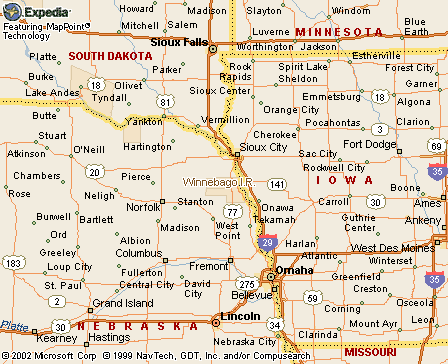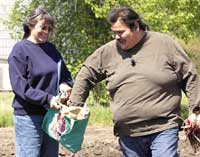|
|
Canku Ota |
|
|
(Many Paths) |
||
|
An Online Newsletter Celebrating Native America |
||
|
June 1, 2002 - Issue 62 |
||
|
|
||
|
Winnebagos Give Blessing to New Healing Garden |
||
|
by Michele Linck Sioux
City Journal staff writer
|
||
|
credits: HoChunk
spiritual leader Stuart Snake, right, takes a handful of prairie
grass seeds from Cecelia Earth following a ceremony Tuesday blessing
the site of the AiKiRuti healing gardens in Winnebago, Neb. (Staff
photo by Tim Hynds)
|
|
"Wherever it falls, it's good," Cecelia Earth pronounced, as she and other participants let loose finger-pinches of native grass seed. The action marked the end of a ceremonial blessing of the small plot of land and the garden's mission. Earth is treasurer of AiKiRuti, the grass-roots community organization that dreamed and prayed its way to that moment. When the dream is complete, the garden, designed on less than an acre of now-rough land, will provide a place where visitors can find spiritual and culture strength to help in their recovery from drug and alcohol addiction -- or prevent addiction altogether. Plans also call for a building to enhance cultural studies at the garden, a 3,600-square-foot Cultural Learning/Visitors Center. AiKiRuti, pronounced I key-ru-dee in the Winnebagos' Ho-Chunk language, means Helping Hand. The AiKiRuti Healing Garden will be more than a peaceful place. It will be planted in grasses, flowers and forbs that have been of cultural and spiritual significance to the Winnebago people. And, it will be a teaching tool, restoring much of the nearly lost lore to the tribe and informing outside visitors as well. Work on the garden, which will include a water pond, is set to start this weekend. Earth said plans for the building will also proceed, although funding for the roughly $700,000 project is still only partially assured. AiKiRuti, which operates under a 501(c)(3) nonprofit organization, has received a three-year $100,000 grant from Nebraska Health Care/Tobacco Settlement Fund and smaller grants from the Nebraska Humanities Council and the Nebraska Statewide Arboretum. It is receiving other kinds of support from the Loess Hills Resource Conservation & Development Council. The RC&D donated the first seeds -- including prairie cone flower, side oats gramma and big bluestem -- to the garden Tuesday. The AiKiRuti organization got its start two years ago in response to a 1999 University of Minnesota study that showed 51 percent of the reservation's adult population, both men and women, could be classified as "severe alcoholic." It also showed the problem was not diminishing. While the Winnebago's own hospital is renowned for its alcohol and drug treatment program, the 12-bed unit is often full and tribal members are sent elsewhere. Once patients were released from any program, there was little continuing support available. AiKiRuti set out to change that. It began by operating a drop-in center with some evening hours, hosting Alcoholics Anonymous meetings and sponsoring informational programs for the broader community. It is temporarily housed in three trailer-classrooms on the garden site, just a block or so off U.S. Highway 77, Winnebago's main street. "A lot of people lose their identity," said Winona Armell, president of AiKiRuti. "Learning about the culture and our ways helps their self-esteem and helps them be proud of who they are." Tuesday's cedaring ceremony was performed by a young tribal spiritual leader, Stuart Snake. Snake told the participants that he was using in the rite some of the last tobacco seeds that had been passed down to him by his late father, the highly esteemed Reuben Snake. He prayed a Christian prayer that the garden would help "eradicate this sickness." The Cultural Learning/Visitors Center will be where tradition meets high-tech. It was designed by Lincoln architect David Littrell of Geller Design Inc. to provide spiritual and cultural context. Plans feature a fireplace at the center symbolizing creation with the four "roads of life," or directions, leading from it. It will feature a kitchen where some of the plants can be prepared or meals for groups catered, and a classroom where AiKiRuti can host speakers, meetings and classes. Groupings of computers will be where young people and adults can use interactive computer games to learn about the garden plants and their historic uses in the Winnebago culture. A lunch was served after the ceremony. In a foreshadowing of plans that Winnebagos will one day prepare and eat some of the garden's healing plants, the meal featured buttery steamed cattails, a food once common to the tribe, and wild rice, a staple of the Ojibway people in Minnesota. Barry Blackhawk, a Ho-Chunk language and culture teacher, said the pre-meal grace in his native language then again in English. He also explained the expression "AiKiRuti," which evokes the action of taking someone's hand and pulling them up, spiritually and emotionally. "It's a very appropriate name they have revived," he said. |

|
www.expedia.com |
|
|
||
|
|
||
| Canku Ota is a free Newsletter celebrating Native America, its traditions and accomplishments . We do not provide subscriber or visitor names to anyone. Some articles presented in Canku Ota may contain copyright material. We have received appropriate permissions for republishing any articles. Material appearing here is distributed without profit or monetary gain to those who have expressed an interest. This is in accordance with Title 17 U.S.C. Section 107. | ||
|
Canku Ota is a copyright © 2000, 2001, 2002, 2003 of Vicki Lockard and Paul Barry. |
||
 |
 |
|
|
The "Canku Ota - A Newsletter Celebrating Native America" web site and its design is the |
||
|
Copyright © 1999, 2000, 2001, 2002, 2003 of Paul C. Barry. |
||
|
All Rights Reserved. |
||
 A
few seeds, ceremonially scattered to Tuesday's brisk wind, marked
the first plantings of a healing garden here.
A
few seeds, ceremonially scattered to Tuesday's brisk wind, marked
the first plantings of a healing garden here.